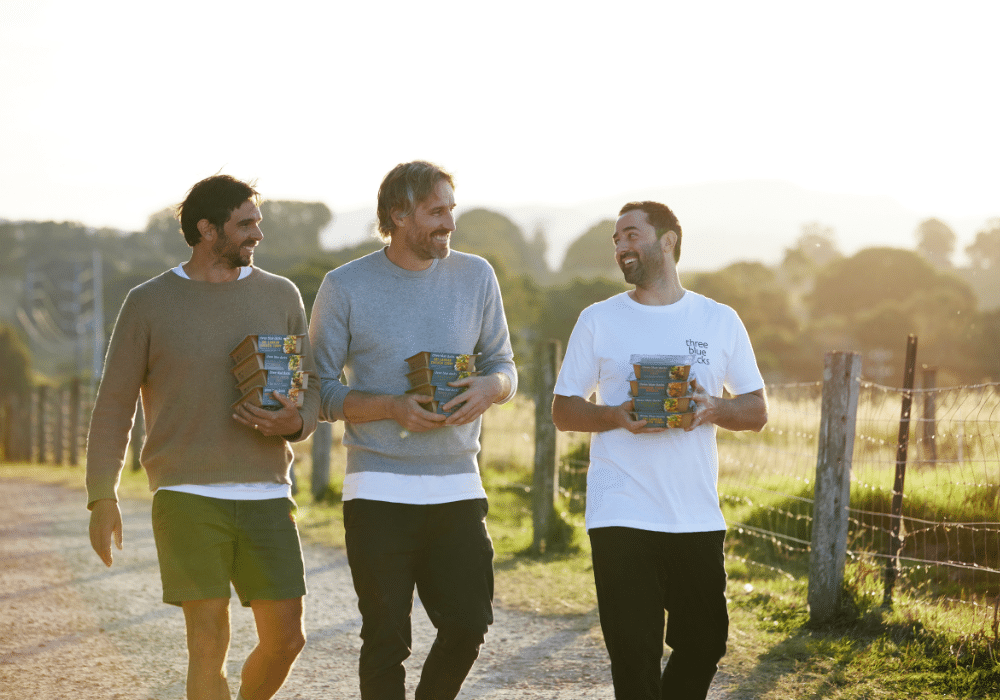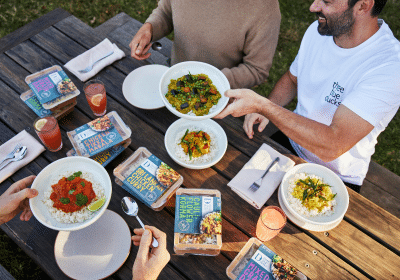Darren Robertson, Mark LaBrooy and Andy Allen are already kicking goals as co-owners of four restaurants, with another opening in mid-July.
But the Three Blue Ducks trio surprised everyone by expanding into retail, turning their famously fresh curries into a new line of heat-and-eat meals for Woolworths and QE supermarkets.
How is the trio sticking to their commitment to ethical and organic cooking in mass-produced ready-made dishes?
Co-owner Darren Robertson admits to worrying about the Ducks’ hard-earned reputation, but he stands by the heat-and-eat range and says each dish has proudly appeared on Three Blue Ducks’ menus.
Q: Did you ever imagine seeing your curries in the fridge at Woolies?
DARREN: No, and it’s still a little surreal to see it on the shelves to be honest.
Q: Many chefs switched to selling heat-and-eat meals during lockdown. How did you scale yours into a bigger business?
DARREN: We’ve been working on this since the lockdown. It definitely isn’t without its challenges, but just like the restaurants, we have a pretty epic team working with us to make it possible.
Q: Can you tell us how Three Blue Ducks made the transition to supermarkets?
DARREN: First and foremost, you need to decide exactly what you wish to go to market with. We already had a large range of products but chose to do something completely different for us. We all love a curry, so this seemed like a great place to start. We developed recipes that we were happy with which is definitely the fun part. After this it’s really scaling your product, branding, packaging, finding great manufacturers and of course distribution.
Q: What do you wish you’d known before embarking on the retail market?
DARREN: We went into this with open eyes and ears, we’re still learning about the retail market. So far, it’s actually been really rewarding. I don’t think we were expecting an easy ride. I would have loved to have known how long things take, to prepare ourselves, but luckily we have restaurants that keep us pretty busy too.
Q: Do you worry that a switch to mass production might impact food quality and tarnish your well-earned brand? If so, how do you get over that?
DARREN: Yes, absolutely. We all agreed that we would only produce products that we would be happy serving in our restaurants, which is exactly what has happened. As it happens, we have the Cauliflower Korma on in three of our menus.
Q: How did you hold on to your commitment to ethical and organic cooking in a mass-produced meal?
DARREN: We discussed every ingredient. Where it was from? Is it free range? Grown in Australia etc? We follow the same guidelines as we do in the restaurants. Not all of what we serve in the restaurants is organic we try our best to champion local food, ethically sourced. That hasn’t changed with the ready meals, around 85 per cent of all the ingredients are grown in Australia, we still source certain ingredients from overseas, such as spices and coconut.
Q: What’s special about your curries?
DARREN: The Sri Lankan Curry is definitely inspired by Mark’s background. The others are plays on curries we love to eat. Indian curries were always a treat growing up in the UK so chicken Tikka was a must. We also wanted a banging vegetarian option, so I developed a cauliflower korma after cooking it for the family many times.
Q: How do you ensure quality control when dishes are produced outside your kitchen and shipped across NSW and Victoria?
DARREN: We have personally been to the manufacturers to oversee and demonstrate how the curries are cooked. There are obviously many challenges, but like a professional kitchen, communication is key.
Q: Packaging is always a headache for food manufacturers. How hard was it to find your eco-friendly containers and how is it low impact on the environment? DARREN: We’ve looked at so much packaging over the past year, the option we have is definitely our best option right now. It was important that it can be recycled and had the least amount of plastic but still food safe. There are many innovations happening now around packaging. It’s absolutely an interest of ours and we will keep looking at ways to improve.
Q: How did you come up with the price point? Times are getting tough… have the latest interest rate increases impacted your decision?
DARREN: The products need to be financially as well as environmentally sustainable. Price point is important, especially in this current climate. We are using premium ingredients in the curries and have worked hard to keep it a fair price.
Q: What’s next for the Ducks? More curries in the supermarket range? Any new venues?
DARREN: Yep, we’re working on developing our range and we’ll be opening a new restaurant in the coming months. No rest for the wicked.
Three Blue Ducks’ heat-and-eat meals are sold at selected Woolworths Metro stores across NSW and Victoria, and QE Food Stores in NSW. The four curries (starting at $14) are chicken tikka masala, Sri Lankan chicken curry, mixed grain dahl and cauliflower korma, with more dishes planned.
The fifth Three Blue Ducks restaurant will open on Thursday, July 13 at The Lodge Bellingen, a luxury resort with mountain views in the hinterland of NSW’s mid-north coast. The three owners are working with head chef Julien Vasseur to create an Asian-inspired menu featuring local farmers including Bello Beef and Coffs Coast Mushrooms. The beverage list will also have a NSW focus, featuring brews from Travla, co-created by Allen and actor Travis Fimmel, working with Woolgoolga Brewing.
The Bellingen venue joins the group’s restaurants in Byron, Rosebery and Nimbo in NSW and Tullamarine’s URBNSURF in Victoria.


